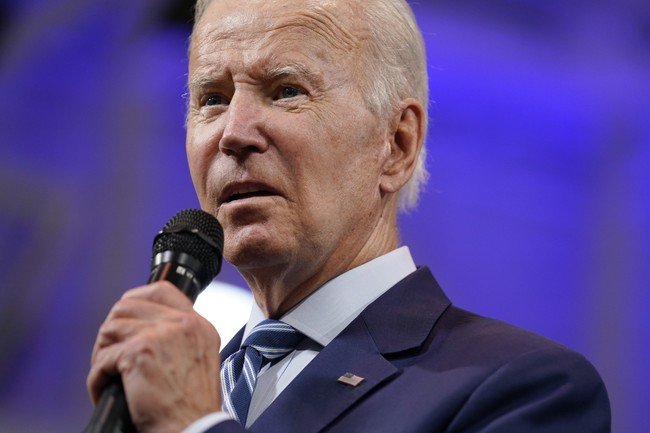If Democrats lose in the off-year election — and it seems increasingly likely, though not certain, that they will — it will be because they lost ground when the country seemed to go mad with excessive COVID shutdowns and irrational obsessions with systemic racism.
Schools were closed, despite the negligible risk to children, and millions of low-income people lost their jobs. People were told they were as racist as they were in the days of slavery and segregation, and that we must defund the police, pay reparations, and impose endless quotas and racial preferences.
Let’s see how the voter reaction develops.
Republicans regain lead in House voting.
In an era of cross-party voting, congressional party support is a good benchmark. The Real Clear Politics average showed Republicans ahead by about 3 points from last November through June. Events — President Joe Biden’s legislative successes, the Dobbs decision, job recovery — seemed to shrink the Republican advantage in August and September.
Republicans took the lead three weeks ago and now have a lead that is slightly larger than in 2014, when they won more House seats (247 of 435) than in any election since the 1920s. Polls focused on likely voters have shown Republicans with a 48% to 45% advantage.
The foundations have taken root: runaway inflation, first sparked by President Donald Trump and then exacerbated by Biden’s COVID-shutdown spending; runaway crime, sparked by liberals’ defunding and defunding the police and no bail and quick release for criminals. Liberal crime policies are deeply unpopular. Racial quotas and college admissions preferences, at the center of a Supreme Court case on colleges to be decided Oct. 31, are opposed by 73% in a Pew Research poll, and quotas have been rejected in eight of nine referendums since 1996, most recently in California in 2020.
The fascination with Trump is over.
Immigration was one of the issues where the only justification for Democratic policy was Orange Man Bad. If Trump had built a wall and forced asylum seekers to wait in Mexico, Biden would have let everyone in. As New York Times reporter Frank Bruni notes, the focus on Biden over Trump “doesn’t quite square with the media coverage of the midterms.” Voters, with the exception of Democratic activists who are, as my colleague David Freddoso says, “crazy about Trump,” are focused on the current president, not the former one.
Latinos are becoming Republicans.
Although much of the media is trying to suppress the story, Democrats are also suffering from unchecked illegal immigration, as Florida Gov. Ron DeSantis has pointed out, flying immigrants to Martha’s Vineyard. It turns out that Latinos, especially in the Rio Grande Valley but elsewhere, identify not with illegal immigrants but with the Border Patrol, which has been ordered to let them into the country, and with the blue-collar workers whose jobs they may threaten.
As Clinton administration veteran William Galston concedes in the Wall Street Journal, “The unique black experience in America is not a model for other minority groups.” Latinos, it turns out, are more like Italians, as I argued in my 2001 book The New Americans , which means they are moving toward Republicans—where they haven’t been getting their fill of big-government money (Florida, Texas, Arizona, Georgia).
The abortion issue has gone peaceful.
Last summer, liberal pundits salivated at the prospect of pro-abortion voters turning Democratic to overturn the Supreme Court’s Dobbs v. Women’s Health decision, which overturned Roe v. Wade. But a New York Times poll this year found that only 5 percent of respondents said abortion was their top issue, and as the Times’ prominent analyst Nate Cohn concluded, “the summer’s push for abortion/democracy/guns is waning.”
I think many abortion advocates assumed that reversing Roe would make abortion illegal everywhere. When they realized that wasn’t the case, their concerns about the issue diminished. Meanwhile, Democrats who support legalizing abortion up to the moment of birth may find themselves on the defensive as Republicans turn to popular restrictions on late-term abortions.
Republican “weak candidates” did better than expected.
Over the summer, it seemed that Republican primary voters, egged on by Trump, had saddled the party with faint senatorial and gubernatorial candidates in races that would otherwise have been winnable. But in recent debates, Republicans so characterized seem to be holding their own: Blake Masters in Arizona, Herschel Walker in Georgia, J.D. Vance in Ohio. In the only debate in Pennsylvania on Oct. 25, the question is not how the smooth-talking Republican Mehmet Oz will fare, but whether Democrat John Fetterman, disabled after a stroke and having trouble understanding spoken words, will respond to the closed captioning he has insisted on.
Blue-state Democrat blues.
The most surprising development in October is the apparent weakness of Democrats in heavily Democratic states like Oregon and New York. Oregon hasn’t elected a Republican governor since 1982, but Republican Christine Drazan is leading in the polls for reasons that seem to have surprised the New York Times’ reporting team, whose story began by highlighting “liberal disharmony,” the gigantic contributions of Nike co-founder Phil Knight and the unexplained unpopularity of retiring Gov. Kate Brown. It wasn’t until the 12th paragraph that they finally addressed “widespread homelessness and safety concerns in Portland, which set a record for murders last year” and a recent law decriminalizing “hard drugs like cocaine, heroin and methamphetamine.”
The Times found time to mention Oregon’s law that accommodates people seeking abortions, but it failed to mention the antifascist violence that plagued Portland during and after “mostly peaceful” demonstrations and riots in the summer of 2020. Even in Oregon, as Nate Hochman reports in the City Journal, there is a backlash against dystopia.
Is something similar happening in other Democratic states? Few House races have public polls this year, and several show Democrats trailing even in states like California, Minnesota and Rhode Island.
More surprising is New York, where Kathy Hochul, elevated to governor after Andrew Cuomo resigned in August 2021, is trailing Republican Rep. Lee Zeldin by just 50% to 44% in the RCP average. He’s ahead by just 50% to 46%, according to Quinnipiac, which shows Sen. Charles Schumer, in his 42nd year in Congress, is trailing Republican Newsmax-TV host Joe Pinion by just 54% to 42%. Schumer has won reelection twice before, with 71% of the vote.
If those numbers are correct, says Cook Political Report analyst David Wasserman, Democrats are at risk of losing seven seats in the New York House of Representatives. And maybe more: State Attorney General Letitia James is trailing 45 percent to 44 percent in the Trafalgar poll, where Republican unknown Michael Henry is leading.
What is the most critical issue in New York? For Democrats, it’s “protecting democracy,” but for Republicans and independents, it’s crime. New Yorkers have known since Mayors Rudolph Giuliani and Michael Bloomberg how nice it is to live in safety, and they’ve seen violent crime skyrocket after the demonstrations and riots that followed George Floyd’s death and the state’s no-bail law. Meanwhile, James is focused on accusing Trump of inflating his assets to apply for loans from gigantic banks. The Trump obsession continues to overwhelm real-life concerns.
I don’t predict Schumer will lose, and if the current poll leaders win, the Senate will remain tied 50-50. But we know that the polls have missed the mark in recent elections, overweighting Republicans in 2012 and maybe 2018, and overweighting Democrats in 2014, 2016, and 2020.
But there is more evidence that Republicans, or some subset of them, are refusing to poll more often than Democrats. Pollsters have a tough time interviewing rural areas, most of which tend to vote strongly Republican. The fundamentals favor Republicans — fundamentals that have their roots in COVID shutdowns and racial reckoning, in decisions made during those crazy times and their consequences now.


